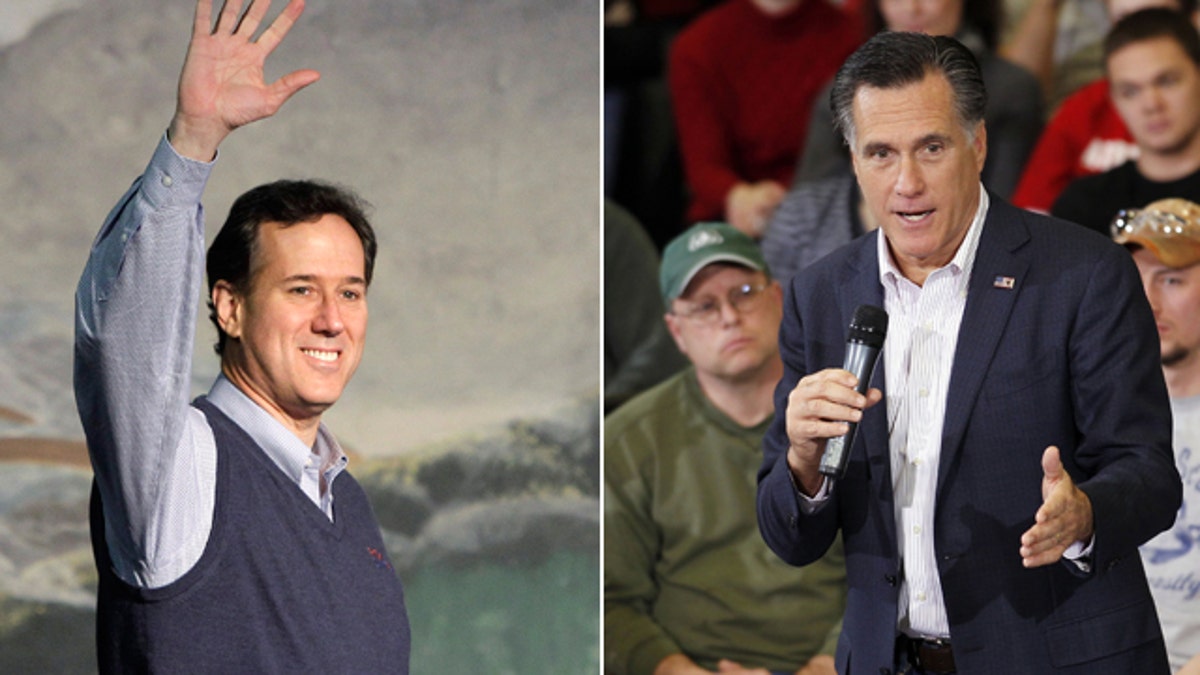
File: Republican presidential candidates Rick Santorum and Mitt Romney (AP/FNC)
In Mississippi and Alabama, Republican presidential hopeful Mitt Romney failed miserably to prove he can win in the South, but now Rick Santorum must prove he can win in a big northern state, where the economy, not social issues, trumps everything.
Illinois will prove a great test between these two candidates.
In Alabama and Mississippi, Mr. Romney struck out with two principal divisions of the conservative movement—Tea Party voters focused more on economic issues and Evangelical Christians more concerned with social issues.
Among the third important conservative cohort—more-educated, more-urban and higher-earning voters—Mr. Romney did somewhat better, but their turnout was low which indicates a pronounced lack of enthusiasm for his candidacy.
To those voters, Mr. Romney sounds more reasonable and has a plan to liberate the economy and country from regulatory overreach, federal pending on steroids, and President Obama’s constant cultivation of class and racial divisions—but he appears unauthentic.
In the minds of many, Mr. Romney earned his personal fortune the wrong way—dealing in financial markets and downsizing companies. Simply put, he looks too much like the Wall Street financiers who caused the recent near death experience of American capitalism. Plus, his tenure as Massachusetts governor was punctuated by MassCare, which provided the template for ObamaCare.
In the general election, Mr. Romney would likely still win the Deep South, but lasting doubts about his authenticity among conservatives could easily push North Carolina and Virginia into the Obama column—two must-win states, along with Florida, for any GOP nominee.
While Santorum might also be able to secure those states, it would prove a more sizeable challenge for him as the party's nominee to win in the Midwestern states that will ultimately decide the election.
Tuesday’s Illinois primary will tell an interesting tale, because Evangelical Christians in the state compose a much smaller share of the voting population than in the South, and the economy, not social issues, should be the top issue.
Unemployment in the state, at 9.4 percent, is well above the national average. Although Illinois’ rural farm belt is doing well, cashing in on strong demand for corn to make ethanol and soy, its cities are still smarting from the recession.
Illinois is not nearly as dependent as Michigan on the auto industry, which was bailed out by Mr. Obama, but instead boasts a broad range of manufacturing in chemicals, petroleum refining, industrial machinery, plastics, and rubber, as well as supporting logistical services and sophisticated financial activities. Those have recouped sales but not added enough new high paying jobs. Why? Because businesses are now suffering from the burden imposed on them by a quagmire of regulations sanctioned by President Obama—rules intended to guard against abuse and calamity, but equally potent at denying success and prosperity.
Rick Santorum has proven he can win votes in rural areas and the South where the economically downtrodden "cling" to their guns and religion, and among the working middle class, who, though more privately tolerant of others sexual preferences, don’t like to be forced to publicly accept gay unions or pay for others' birth control.
But there's still a problem -- Mr. Santorum hasn’t shown he has a credible plan for the economy that he will need to use to win over voters in northern states. And these are states with many fewer Evangelicals and more highly educated populations. Merely promising lower taxes, deregulation and freer markets are not enough.
President Obama’s approval ratings for managing the economy—and with those his prospects for reelection—have proven highly volatile. A few months of decent employment growth and they soared above 50 percent—a level pundits claim equals electoral invincibility—but a quick spike in gas prices and those ratings began to plunge to the low forties—a level implying certain vulnerability.
Americans, other than those composing the president’s loyal liberal base, are greatly suspicious of Mr. Obama’s economic policies and credentials. His big spending and deficits, hard-left inclinations on business and regulatory policy, constant alibiing and reluctance to accept responsibility and make adjustments when things go wrong make swing voters focused on the pragmatic when they assess the president's performance.
But back to the Republicans. Mr. Santorum, if he can beat Mr. Romney in Illinois, could prove that voters are at least willing to listen to him on the economy. That could then give him the opportunity to flesh out a more credible alternative to Mr. Obama’s economic plan in the fall campaign.
Peter Morici is a professor at the Smith School of Business, University of Maryland School, and former Chief Economist at the U.S. International Trade Commission. Follow him on Twitter@pmorici1.
